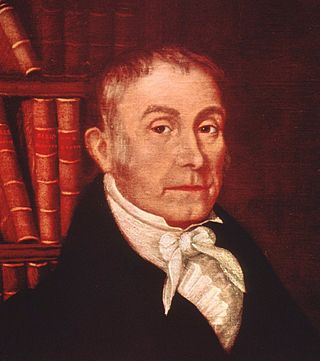
Ephraim McDowell was an American physician and pioneer surgeon. The first person to successfully remove an ovarian tumor, he has been called "the father of ovariotomy" as well as founding father of abdominal surgery.

Cyclopædia: or, An Universal Dictionary of Arts and Sciences is an encyclopedia prepared by Ephraim Chambers and first published in 1728; six more editions appeared between 1728 and 1751 with a Supplement in 1753. The Cyclopædia was one of the first general encyclopedias to be produced in English.
Alphos is a form of non-contagious leprosy, formerly described by the physician Celsus under the name of vitiligo, a term now used for another skin disease. In alphos, the skin is rough, and looks as if it had drops of white on it, not much differing from morphea.
An archiater was a chief physician of a monarch, who typically retained several. At the Roman imperial court, their chief held the high rank and specific title of Comes archiatrorum.
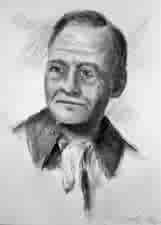
Ephraim Bateman represented New Jersey in the United States Senate from 1826 to 1829 and in the United States House of Representatives from 1815 to 1823.

Axungia is a kind of soft animal fat, usually from around the kidneys of geese or pigs, used in pre-modern western medicine. It differs from lard, which is firm, and suet or adeps, which is dry.
Azone is a term in mythology anciently applied to gods and goddesses that were not the private divinities of any particular country or people. Azones were acknowledged as deities in every country, and worshipped in every nation. The word is etymologically derived from Greek for "without" and "country". The azones were to a degree above the visible and sensible deities, which were called zonei, who inhabited some particular part of the world, and never stirred out of the district or zone that was assigned them.
Basilicon, or basilicum, is the name given to various ointments that were believed to have 'sovereign' virtues. One such example was an unguent composed of rosin, wax, pitch, and oil, which pre-modern surgeons used as a suppurative.

Ma'ale Efrayim is an Israeli settlement in the West Bank, organized as a secular settlement and a local council, located along the eastern slopes of the Samarian mountains in the Jordan Valley. It was founded in 1978 and named after the Biblical tribe of Ephraim. The settlement's municipal status was upgraded to local council in 1981. In 2021, it had a population of 1,318.
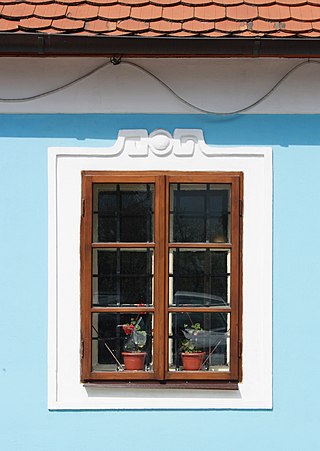
In architecture and joinery, the chambranle is the border, frame, or ornament, made of stone or wood, that is a component of the three sides round chamber doors, large windows, and chimneys.

Efraim Sneh is an Israeli politician, physician, and a retired brigadier general in the Israel Defense Forces. He was a member of the Knesset for the Labor Party between 1992 and 2008 and served in several ministerial posts. He currently heads the Yisrael Hazaka party, which he established in May 2008.
Baruch ben Isaac, called usually from Worms or from France (Tzarfat) was born approx. in 1140 and deceased in 1212 in Eretz Israel where he went in 1208 together with his friend Samson ben Abraham of Sens. He is not to be identified with another Baruch ben Isaac (fl. 1200), a Tosafist and codifier who was born at Worms, but lived at Regensburg, (he is sometimes called after the one and sometimes after the other city).

Rabbi Ephraim ben Israel Alnaqua (1359–1442) was a physician, rabbi, theological writer, and founder of the Jewish community at Tlemçen (Algeria), where he died in 1442.
Joel Hart was a physician; the only son of Ephraim Hart; born in Philadelphia in 1784; died in New York City June 14, 1842. He received the degree of M.D. from the Royal College of Physicians and Surgeons, London. He was one of the charter members of the Medical Society of the County of New York. He married, May 2, 1810, in London, to Louisa Levien, and had issue. On Feb. 7, 1817, he was appointed by President James Madison United States consul at Leith, Scotland, and remained there in that capacity until 1832, when he returned to New York and resumed the practice of medicine.
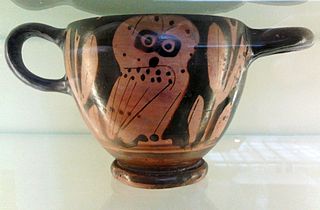
In classical antiquity, the cotyla or cotyle was a measure of capacity among the Greeks and Romans: by the latter it was also called hemina; by the former, τρυβλίον and ἡμίνα or ἡμίμνα. It was the half of the sextarius or ξέστης, and contained six cyathi, or nearly half a pint English.
Aaron Solomon Gumperz was a Jewish German scholar and physician.
Ephraim is a masculine given name of Hebrew and Aramaic origin, first used by the Israelite patriarch of that name. In the modern English language it is typically pronounced. In Hebrew, the name means "fruitful, fertile and productive".
Ephraim Smith was a 19th-century American physician and businessman who served as the first mayor of Boise, Idaho Territory, in the mid 1860s. For years it was believed Smith's successor, Henry E. Prickett, was the city's first elected mayor until recent research proved otherwise. Smith is also believed to have been the first treasurer of Idaho Territory. In addition to his political career, Smith also operated a drug store and private hospital in Boise.
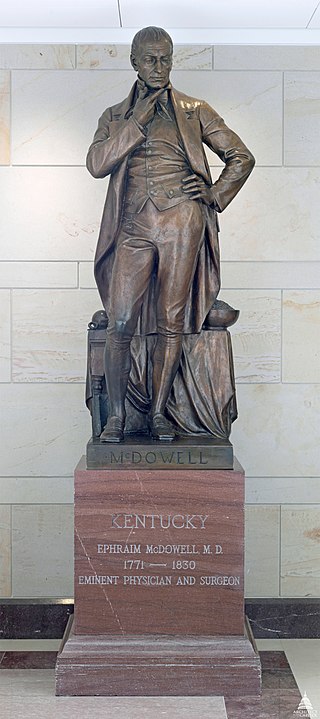
Ephraim McDowell is a bronze sculpture depicting the American physician and surgeon of the same name by Charles Henry Niehaus, installed in the United States Capitol Visitor Center, in Washington, D.C., as part of the National Statuary Hall Collection. The statue was gifted by the U.S. state of Kentucky in 1929.
Ephraim ben Samson was a 12th-century French tosafist and biblical expounder.









